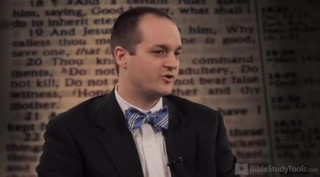
- Recent Translations
- All Translations
Jude 1:24
Share
Settings
Doxology
24 To him who is able to keep you from stumbling and to present you before his glorious presence without fault and with great joy—Jude 1:24 in Other Translations
Jude 1:24 Meaning and Commentary
Now unto him that is able to keep you from falling
The people of God are liable to falling into temptation, into sin, into errors and mistakes, from an exercise of grace, or from a degree of steadfastness in Gospel truths, and even into a final and total apostasy, were it not for divine power; and they are not able to keep themselves. Adam, in his state of innocence, could not keep himself from falling; nor could the angels, many of whom fell, and the rest are preserved by the grace of God; wherefore, much less can imperfect sinful men keep themselves, they want both skill and power to do it; nor can any, short of Christ, keep them, and it is his work and office to preserve them; they were given to him with this view, and he undertook to do it; and sensible sinners commit themselves to him, as being appointed for that purpose; and this is a work Christ has been, and is, employed in, and he is every way qualified for it: he is "able" to do it, for he is the mighty God, the Creator and upholder of all things; and as Mediator, he has all power in heaven and in earth; instances of persons kept by him prove it; and there is such evidence of it, that believers may be, and are persuaded of it: and he is as willing as he is able; it is his Father's will he should keep them, and in that he delights; and as he has undertook to keep them, he is accountable for them; besides, he has an interest in them, and the greatest love and affection for them; to which may be added, that the glory of the Father, Son, and Spirit, in man's salvation, depends on the keeping of them: and what he keeps them from is, from falling by temptations, not from being tempted by Satan, but from sinking under his temptations, and from being devoured by him; and from falling by sin, not from the being or commission of sin, but from the dominion of it, and from the falling into it, so as to perish by it; and from falling into damnable heresies; and from the true grace of God, and into final impenitence, unbelief, and total apostasy. Instead of "you", the Alexandrian copy reads "us", and some copies "them":
and to present [you] faultless before the presence of his glory with
exceeding joy;
to himself, in this present state of things, as washed in his blood, and justified by his righteousness, and hereafter in the millennium state, and in the ultimate glory; and also to his Father, and this he died to do, and in some sense did it at his death, even in the body of his flesh, through death, and now as the representative of his people in heaven; and will at the last day, when he will deliver them up complete and perfect; all which is in consequence of his suretyship engagements: and this presentation is made "before the presence of his glory"; either before the glorious presence of Christ, or Christ himself, who is glorious, and will appear in glory, in his own, and in his Father's, and in his holy angels; or else before the glorious presence of God the Father, and who is glory itself: and the condition in which the saints are, and will be presented, is "faultless"; though they have sinned in Adam, and were so wretchedly guilty and filthy in their nature state, so prone to backslidings, and guilty of so many after conversion, and though a body of sin and death is carried by them to the grave; yet they will at last be presented by Christ in perfect holiness, in complete righteousness, and in the shining robes of immortality and, glory. The manner in which they will be presented is "with exceeding joy"; in themselves, for what they shall be delivered from, from sin and sorrow, and every enemy, and for the glory and happiness they shall then enjoy; and also in the ministers of the Gospel, who will then bring their sheaves with joy, and then will their converts be their joy and crown of rejoicing; and likewise this presentation will be with the joy of angels, for if they rejoice at the conversion of men, much more at their glorification; and even with the joy of Father, Son, and Spirit.

